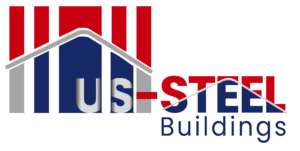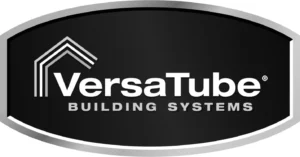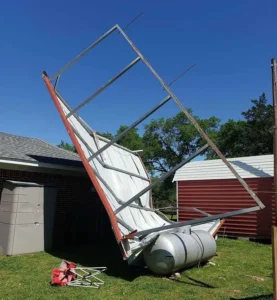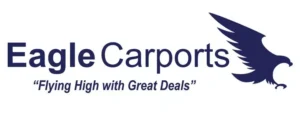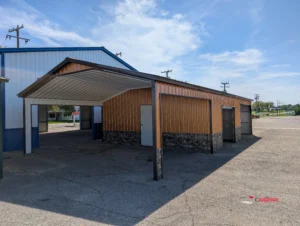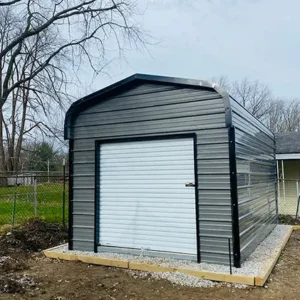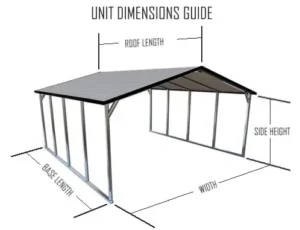8 Minute Read
Wind Loads for Metal Buildings & Carports: A Complete Guide
When severe weather strikes, your metal building’s ability to withstand powerful winds can mean the difference between protection and devastation. At The Carport Co., we understand that wind resistance isn’t just a technical specification—it’s your guarantee that your investment will remain standing when you need it most.
This comprehensive guide explains everything you need to know about wind loads, why they matter, and how our structures are engineered to exceed standards.
Questions? Call (888) 293-5588 or email [email protected] to speak with our sales team.
Get Your FREE Custom Quote
It’s quick and easy! Get a quote for an engineer certified metal building or carport today!

Manufactured in the United States

Competitive Warranties

Licensed and Insured Installers

Outstanding Customer Service
Structures That Stand Strong™
Table of Contents
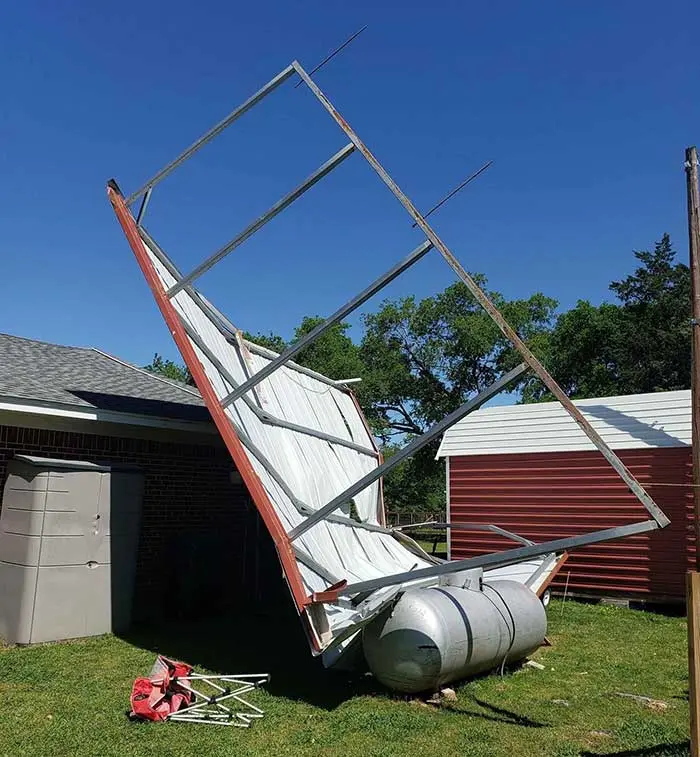
What Are Wind Loads and Why Do They Matter?
Wind load refers to the force exerted by wind on a structure. This force isn’t consistent—it creates complex pressure patterns that push, pull, and twist your building in multiple directions simultaneously. Understanding wind loads is crucial because:
- Safety: Inadequate wind resistance can lead to catastrophic structural failure
- Investment Protection: Your carport or metal building protects valuable assets
- Code Compliance: Local building codes mandate specific wind load ratings
- Insurance Requirements: Many insurers require proof of appropriate wind ratings
- Resale Value: Properly engineered buildings maintain higher value
Unlike temporary weather events, wind is a persistent force that tests your structure’s integrity year after year. A building designed for proper wind loads will maintain its structural integrity throughout its lifetime, while inadequately designed structures may fail during the first major storm.
Understanding Wind Load Calculations
Wind load requirements vary significantly based on:
Geographic Location
Coastal areas, open plains, and mountain passes typically have higher wind load requirements than sheltered inland locations. For example:
- Coastal Regions: May require 140+ mph wind ratings
- Tornado Alley States: Often require 115+ mph ratings
- Protected Inland Areas: May require 90+ mph ratings
Building Dimensions
Taller and wider buildings create larger surface areas that catch more wind. Additionally, the ratio of height to width affects how wind flows around and over your structure.
Roof Design
Different roof styles perform differently under wind loads:
- Vertical Roof: Superior wind resistance due to panels running vertically, allowing wind to flow more efficiently
- A-Frame/Boxed-Eave: Moderate wind resistance
- Regular/Horizontal Roof: Basic wind resistance suitable for calmer regions
How The Carport Co. Exceeds Wind Load Requirements
At The Carport Co., we don’t just meet minimum standards—we exceed them. Here’s how:
Engineering Excellence
- Heavy-Duty Frames: Our galvanized steel frames use thicker gauge material at critical stress points
- Reinforced Connections: Our connection methods distribute wind forces throughout the entire structure
- Strategic Bracing: Additional bracing at vulnerable points prevents twisting and racking
Customized Wind Solutions
We tailor each building to your specific location’s requirements:
- We analyze your exact location using our Wind and Snow Load Tool
- We consider local topography and exposure conditions
- We recommend appropriate upgrades based on your specific needs
- We engineer a solution that exceeds local building code requirements
Exclusive Lifetime Wind Warranty
In many regions, we offer an industry-leading lifetime wind warranty that covers:
- Structural integrity against specified wind speeds
- Frame components
- Panel attachment systems
This warranty reflects our confidence in our engineering standards and commitment to your long-term satisfaction.
Critical Wind-Resistant Features
When selecting a metal building for high-wind areas, prioritize these features:
Anchoring Systems
The connection between your building and the ground is your first line of defense:
- Concrete Anchors: Provide superior hold in permanent installations
- Mobile Home Anchors: Excellent for temporary installations or sites without concrete
- Auger Anchors: Ideal for installations on gravel or soil
Frame Design
- Closer Frame Spacing: Reduces the load on individual components
- Thicker Gauge Materials: Resist bending and deformation
- Hat-Channel Purlins: Provide superior strength compared to standard purlins
Roof and Panel Systems
- Vertical Roof Panels: Superior wind resistance with vertical panel orientation
- Tighter Screw Patterns: Prevent panel separation during high winds
- Ridge Caps and Closures: Prevent wind from getting underneath panels
Using Our Wind Load Calculator
Our Wind and Snow Load Tool takes the guesswork out of determining your requirements:
- Visit our Load Requirements page
- Enter your specific address
- Select “Risk Category 1” and “Wind” + “Snow”
- Click “View Results” and use these specifications when requesting a quote on our Get Quote page or when designing your building with our 3D Builder
This precision ensures you’re not underbuilding (and risking structural failure).
Real-World Performance
The true test of any engineering standard is real-world performance. Our customers throughout hurricane-prone regions, tornado alley, and high-wind mountain passes report exceptional structure integrity even after experiencing severe weather events.
Visit our Photos page to see examples of our buildings in various environments, including high-wind regions where specific reinforcements are visible.
Comparing Wind Load Ratings
When shopping for metal buildings, be wary of misleading wind load claims. Some manufacturers advertise high wind ratings without specifying:
- Whether the rating applies to the entire structure or just components
- If the rating includes proper anchoring
- What exposure category was used in calculations
- Whether the rating is certified by an engineer
At The Carport Co., we provide transparent, engineer-certified wind load ratings that represent real-world performance, not just theoretical maximums.
Why Choose The Carport Co. for Your Carport or Metal Building?
When you choose The Carport Co., you’re not just buying a metal building or carport—you’re getting a partner who’s committed to your satisfaction. Here’s what sets us apart:
Competitive Pricing: All of our pricing is either factory-direct, or less than factory direct through dealer exclusive sales and discounts.
Nationwide Coverage: We serve the majority of the United States, bringing durable carports to your doorstep (or driveway).
Premium Materials: Our metal buildings are made from prefabricated tube steel (galvanized steel), available in both 14-gauge and 12-gauge for added strength and durability.
Expert Guidance: Our team is here to help you every step of the way, from choosing the right structure to installation.
Table of Contents
Frequently Asked Questions
How do I know what wind load rating I need for my carport?
The required wind load rating depends on your specific location, local building codes, and insurance requirements. The most accurate way to determine your needs is to use our Wind and Snow Load Tool, which calculates requirements based on your exact address using ASCE Hazard data. Alternatively, you can contact your local building department for minimum code requirements.
What's the difference between certifed and non-certified carport buildings?
Certified buildings undergo engineering analysis and are designed to meet specific wind load requirements according to building codes. They come with documentation verifying their compliance, which is often required for building permits and insurance. Non-certified buildings may be less expensive initially but lack verification of their wind resistance capabilities and may not meet local code requirements, potentially leading to permit issues, insurance problems, or structural failure.
Can I upgrade my existing metal building for better wind resistance?
Yes, existing structures can often be reinforced for improved wind resistance. Common upgrades include:
- Adding additional anchors
- Installing reinforcement braces
- Upgrading to heavier gauge framing at stress points
- Converting to vertical roof panels
- Adding gusset plates at connections
Do vertical roof carports perform better in high winds?
Yes, metal buildings and carports installed with a vertical roof offer superior wind load ratings, as they allow wind to flow more efficiently over the structure and the design reduces uplift pressure by directing wind forces downwards.
What anchoring system is best for high-wind areas?
Concrete anchoring provides the strongest wind resistance for metal buildings. We recommend:
- Mobile home anchors for temporary installations (minimum 30″ depth)
- Concrete anchors for permanent installations (embedded in 4″+ thick concrete)
- Increased anchor quantity in high-wind zones (typically 25-50% more than standard)
- Corner reinforcement anchors to prevent twisting
Our engineering team can provide specific anchoring recommendations based on your location’s wind requirements. Get a quote today.
How do hurricanes and tornadoes affect metal building requirements?
Areas prone to hurricanes and tornadoes require specialized considerations:
- Hurricane zones typically require wind ratings of 140-170 mph
- Tornado-prone regions benefit from enhanced anchoring systems
- Both require closer frame spacing (typically 4′ vs. standard 5′)
- Additional roof bracing is recommended
- Heavier gauge materials may be required
Our structures for these regions include multiple reinforcement features and come with appropriate certifications for insurance purposes.
Does building size affect wind resistance?
Yes, significantly. Larger buildings create more surface area for wind to push against, requiring more robust engineering. Additionally:
- Taller buildings experience stronger winds and greater leverage effects
- Wider buildings may require additional central supports
- Longer buildings need more lateral bracing to prevent racking
- The ratio of height to width affects aerodynamic performance
Our engineers account for all dimensional factors when designing wind-resistant structures.
What maintenance helps maintain wind resistance over time?
Regular maintenance preserves your building’s wind resistance capabilities:
- Inspect and tighten all fasteners annually
- Check anchoring systems after major storms
- Examine frame components for any bending or stress
- Replace any damaged or missing panels promptly
- Clear debris from roof and gutters
- Ensure doors and openings close securely
We recommend an inspection every 2-3 years in high-wind regions.
Can carports withstand high winds?
Yes, carports can withstand high winds up to 180 MPH, if they are engineered properly.
Read more: Can Carports Withstand High Winds?
Ready to Begin Your Project?
Do you think The Carport Co. would be a good fit for you? We’d love to earn your business. Fill out the quote form, and one of our friendly representatives will be in touch with you shortly. We’re here to answer questions you may have, provide personalized recommendations, and get you an estimate on your project.
To speak with someone, call (888) 293-5588 or email [email protected].
Don’t miss out on the opportunity to enhance your property with a durable, versatile, and visually appealing metal structure. Contact The Carport Co. today and experience what we can do.
Visit our 3D Builder to design your own structure!
Get Your FREE Custom Quote
No-obligation, 100% FREE quote, delivered in minutes.
The Ultimate Buyer’s Guide is a collection of articles by The Carport Co. These articles have been catered to first time steel and metal carport, garage, and commercial building buyers. Our goal is to share as much information with customers as possible, to help make informed decisions, and ensure a customer doesn’t discover an addition they would have liked to added at the time of sale, but was not aware of the option’s existence.
Here is a preview of a few articles. To view the full Buyer’s Guide, please visit the Ultimate Buyer’s Guide page.
